If you like, you can skip all the preliminary prattling about knowledge and scroll down directly to the SORT-OF-"TV REVIEW" PART
>
When Howie and I first knew each other, we were growing up as Brooklyn boys, which means we lived in a basically pedestrian-plus-public-transport world. But when he finished the round of world travels he's written about frequently here, he wound up settling in California, and was transformed into a car person, and thus a car-radio person.
 And so it was from him that I learned most of what I knew early on about phenomena like Rush Limbaugh. While he drove, he derived some sort of perverse pleasure from listening to those vicious right-wing loons--and of course the sorts of people who called in to spill their sad, toxic guts.
And so it was from him that I learned most of what I knew early on about phenomena like Rush Limbaugh. While he drove, he derived some sort of perverse pleasure from listening to those vicious right-wing loons--and of course the sorts of people who called in to spill their sad, toxic guts.Through all this contact with the gathering Right-Wing Noise Machine, he provided my earliest warnings about:
• the potency of the budding RWNM, and--
• the crucial importance to it of repetition--unceasing, grinding, mind-numbing, day-in-and-day-out repetition.
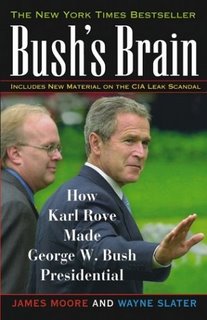 Even before Karl Rove and his Republican stooges had come to understand the full potential of the RWNM, with refinements like Fox "News" and the brave new world of Republican Talking Points, Howie talked about the importance of repetition in drilling those primitive, monosyllabic messages into the heads of the poor souls who had plugged into the new propaganda machine.
Even before Karl Rove and his Republican stooges had come to understand the full potential of the RWNM, with refinements like Fox "News" and the brave new world of Republican Talking Points, Howie talked about the importance of repetition in drilling those primitive, monosyllabic messages into the heads of the poor souls who had plugged into the new propaganda machine.We're not so good at this, over here on the other side of the political spectrum. We tend to get queasy by, oh, the second or third time we make a point--and that's without even reckoning on our stubborn insistence on clinging to frills like nuance in formulating and evaluating ideas.
Even all of this is my apologetically long-winded way of sneaking into saying again something I've said a number of times here on DWT. Which is silly on the face of it. There are undoubtedly lots of people out there who've never read any of those earlier pieces.
What I've been trying to get to is: I wish I could feel better about this week's vote in Kansas overturning the former majority on the state education board whose crowning accomplishment was forcing the state's children to be miseducated on the subject of evolution.
Don't get me wrong. I was pleased, naturally. But to think we've reached a point where we can hail as a political turning point such a basic step backward from a culture that has come to worship mindless superstition and ignorance! How on earth could we ever have gotten to such a place?
Of course, having gotten to such a place, the only way back is: one step at a time.
The point I wanted to repeat is that, for all the horrors and depredations of the extremist right-wing movements that have come together to form the administration of George W. Bush, what personally grieves me most is the assault on knowledge and the worship of ignorance.
I assume that for anyone who's found his/her way to this blog I don't have to rehash the details: the conscious outright rejection, from the highest policy levels down to the smallest bureaucratic functioning, of every aspect of the quest for understanding which has been a central feature of human existence since the dawn of our species.
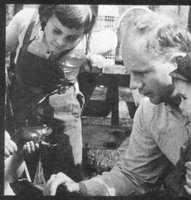 One of my all-time favorite nuggets of wisdom--and here again I'm repeating myself--is an observation from that singular educator the late John Holt, in his book How Children Learn:
One of my all-time favorite nuggets of wisdom--and here again I'm repeating myself--is an observation from that singular educator the late John Holt, in his book How Children Learn:"A child has no greater desire than to make sense of the world around him."
Holt's context was specifically educational. He was deploring the professional education establishment's obsession with "motivation," as in "motivating" children to learn, when in fact, he argued, children have an obsessive need to learn. "Making sense of the world around us" has become my working definition of "learning," and I really believe it is built into the brain of every normal human being—until it's overriden by adults who've opted for ignorance.
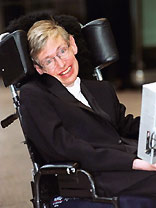 And I do understand the appeal of the worship of ignorance. Alongside the vast mysteries of the universe, even the most remarkable human intelligence--even Stephen Hawking's, say--is puny and insufficient. But the natural instinct nevertheless, I believe, is still to try to make some sense of it all.
And I do understand the appeal of the worship of ignorance. Alongside the vast mysteries of the universe, even the most remarkable human intelligence--even Stephen Hawking's, say--is puny and insufficient. But the natural instinct nevertheless, I believe, is still to try to make some sense of it all.In time, humans discovered that we could build on our puny bits of knowledge, step by step, always attempting to verify what was already "known," throwing out the "knowledge" that didn't hold up while adding to it new discoveries and formulations and hypotheses, which were then subjected to the same process of verification and expansion.
With regard to the physical world around us, the process took the form of "the scientific method," by which our body of knowledge gradually increased enormously. This is, of course, what scientists mean by a "theory," which the right-wing loonies refuse to understand, no matter how often or how patiently you explain it to them. Even after a theory is well established and the basics are, well, basically understood, it remains subect to further verification and expansion, correcting the mistakes and filling in the blanks. There is much scientific disagreement about the details of the "theory" of evolution, but no responsible disagreement about its basic reality.
In the area of how and why we live, mankind developed a "marketplace of ideas," to build in a similar fashion on the accumulated wisdom of our forebears. And in both the physical and the intellectual domains, puny as our accumulated wisdom may always be relative to the vastness of the universe, we know vastly more than we once did.
This isn't pure gain, of course. Like anything else, knowledge can be used equally well for good and for bad ends. And so we've learned ever so much more about how to feed and properly nourish the world's population, and we've also learned how to poison that population and our environment. Smart people have found exciting new ways to help the world's people live together in peace, but also to make hatred, ignorance and envy tools for unprecedented destruction.
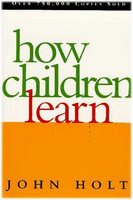 But still, I believe with John Holt that the natural impulse is to want to understand more about the world around us. It's not the only response, however. Another way of looking at all those mysteries of the universe and of human nature is to recoil in terror--to opt instead for a prefabricated set of answers that protect you from having to contemplate all that mysteriousness.
But still, I believe with John Holt that the natural impulse is to want to understand more about the world around us. It's not the only response, however. Another way of looking at all those mysteries of the universe and of human nature is to recoil in terror--to opt instead for a prefabricated set of answers that protect you from having to contemplate all that mysteriousness.For reasons I won't begin to try to explore here, somehow the U.S. over the last several decades has fallen into the grip of the worshipers of ignorance, until they finally put one of their own--a man whose only outstanding quality is his worshipful adherence to the cause--in the White House.
I shudder to think of the clean-up operation that's going to be necessary once these demons are finally expunged from the executive branch of our government--and perhaps, slowly, weakened in Congress, not to mention the courts, which have been so resolutely packed with apostles of ignorance, many of them with lifetime tenure. Well, the only way to do it, as in the case of this week's vote in Kansas, is one step at a time. Obviously, the sooner we start, well, the sooner we can hope to see results.
Well, that's basically what I wanted to say. I warned you there wasn't going to be anything new, didn't I? You knew it all before, didn't you? Of course you did. But maybe somebody out there will be inspired to figure out how we can wake up the Rove-ian slumberers, give courage to all those people so afraid of knowledge and help figure out what to do with it as we acquire more of it.
 Remember, the neocons who plunged us into the mindless, purposeless war in Iraq believe to this day that they were applying a body of carefully evolved knowledge! Once again I wonder if we don't all need to go back to David Halberstam's reckoning of the geniuses who supersmarted us into the quagmire of Vietnam, The Best and the Brightest. And while I could swear I heard Halberstam say in a recent interview that there's a new anniversary edition of the book, the 20th Anniversary Edition pictured here, which dates all the way back to 1993 (ancient in publishing terms), is still very much available.
Remember, the neocons who plunged us into the mindless, purposeless war in Iraq believe to this day that they were applying a body of carefully evolved knowledge! Once again I wonder if we don't all need to go back to David Halberstam's reckoning of the geniuses who supersmarted us into the quagmire of Vietnam, The Best and the Brightest. And while I could swear I heard Halberstam say in a recent interview that there's a new anniversary edition of the book, the 20th Anniversary Edition pictured here, which dates all the way back to 1993 (ancient in publishing terms), is still very much available.OKAY, HERE'S THE SORT-OF-"TV REVIEW" PART
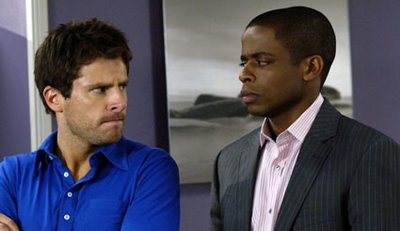 Have you been watching USA Network's new Friday-night series Psych? I assumed I would hate it, since I have no patience for or susceptibility to "real" or outright-fake mysticism. Nevertheless, thanks to the miracle of DVR technology (see what wonders knowledge can bring us?), I recorded a couple of episodes--and eventually discovered that it's quite charming.
Have you been watching USA Network's new Friday-night series Psych? I assumed I would hate it, since I have no patience for or susceptibility to "real" or outright-fake mysticism. Nevertheless, thanks to the miracle of DVR technology (see what wonders knowledge can bring us?), I recorded a couple of episodes--and eventually discovered that it's quite charming. If possible, you really want to see the pilot episode (USA is bound to do a marathon soon of the episodes-to-date), where a goofily likable, career-challenged high school graduate named Shawn Spencer, played ever so winningly by James Roday, makes the life-changing discovery that it's easier to get people to believe that you're a psychic than that you're just really, really observant.
If possible, you really want to see the pilot episode (USA is bound to do a marathon soon of the episodes-to-date), where a goofily likable, career-challenged high school graduate named Shawn Spencer, played ever so winningly by James Roday, makes the life-changing discovery that it's easier to get people to believe that you're a psychic than that you're just really, really observant.Poor Shawn has had the misfortune to grow up with a police-officer father who has given him nothing except a forced lifelong immersion in observation: an obsessive, all-consuming attention to every kind of detail in the world around him. (Which goes to show that even John Holt's idea of learning, making sense of the world around us, can be carried to a compulsively, dehumanizingly preposterous extreme.)
 The now-retired senior Spencer, played by Corbin Bernsen, appears each week in an opening scene that flashes back to Shawn's childhood--and sometimes also in present-day scenes, where we get fascinating glimpses of Shawn and Henry's present-day relationship. Small as these scenes are, they're spectacular, and surely the best thing Bernsen has ever done.
The now-retired senior Spencer, played by Corbin Bernsen, appears each week in an opening scene that flashes back to Shawn's childhood--and sometimes also in present-day scenes, where we get fascinating glimpses of Shawn and Henry's present-day relationship. Small as these scenes are, they're spectacular, and surely the best thing Bernsen has ever done.When he played Arnie Becker on L.A. Law, strong as his acting was, it was almost inevitably hardly noticed in the shadow of his--the actor's and the character's--looks. Now he's evolved a great look for an authentically adult dramatic actor, and the acting skills seem off the chart. We may yet be astonished by what he's going to do as an actor.
It's totally understandable that the last thing Shawn wants to be is his father, or anything like him, but he can hardly help himself--the one thing he's been trained to do is use his fanatical powers of observation to solve crimes. But he can't make the Santa Barbara police, to whom he provides frequent crime-solving tips, believe that it's all a matter of noticing--noticing stuff that the cops don't. And so, when he's forced to prove that his insights don't come from "guilty" knowledge, he has the sudden off-the-wall inspiration to claim that he's psychic. It's not an easy idea to sell, but still a lot easier than the idea that all he does is pay the utmost attention to detail and then figure out how those details fit together.
 Into his improbable new "career" as a psychic Shawn drags his old pal "Gus" Guster, wonderfully played by Dule Hill (from The West Wing). I don't know how long they can keep Psych fresh--frankly, this week's episode seemed to me to be running out of steam--but the premise alone makes the show, created and written by Steve Franks, a treat in my book.
Into his improbable new "career" as a psychic Shawn drags his old pal "Gus" Guster, wonderfully played by Dule Hill (from The West Wing). I don't know how long they can keep Psych fresh--frankly, this week's episode seemed to me to be running out of steam--but the premise alone makes the show, created and written by Steve Franks, a treat in my book.




2 Comments:
I will have to remind mr teach that this is on and get him to DVR it also.
Thanks Ken. Loved the piece.
This speaks somewhat to my alarm at Gingrich's proclamation that we are insurgents.
On the larger points of the first part of your piece, I think its true that we have come a long way backwards in recent years. The reasons are vast and complicated. Probably a Doctoral thesis in there. It is also true that humans have an instinctive drive to make sense of the world.I've writen before about the rise of mythology driven by the primative or I guess I should say uneducated mind questing for understanding in the face of forces that would seem supernatural. Science arose when mythology no longer provided answers to the questions that would invariably arise as man became more sophisticated.
I also think its true that scientific achievment and advances in culture came about primarily through the efforts of a few men and women throughout history. Individuals who were driven by a quality that many if not most did not possess. Those few genius' and savants who saw beyond and had to understand why. Without those individuals we would have not advanced much beyond second century technology. Thats because for everyone of those there were plenty who would take advantage of the ignorance of mankind. His fear of change and the unknown. Through the use of poisonous lies and deceit, coupled with the promise of reward for compliance these individuals have throughout history held back or slowed down progress. Imagine where we would be without the dark ages.
Where we are now is a result of our own making. The VRWC merely took advantage of a character flaw in man. This time though they not only held up progress, they actually took us backwards. No mean feat. Lets just make sure they get all the "reward" they deserve
Post a Comment
<< Home